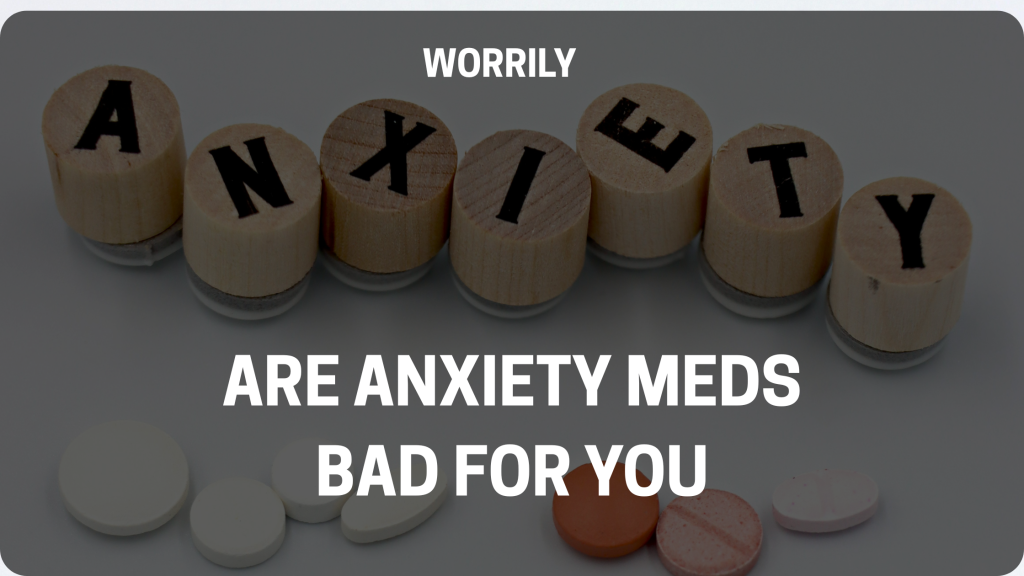Living with anxiety can feel like carrying an invisible weight that never lightens. The racing thoughts, constant worry, physical symptoms, and overwhelming sense of dread affect over 275 million people worldwide, according to the World Health Organization. If you’re among the 31.1% of U.S. adults who will experience an anxiety disorder at some point in their lives, you’ve likely wondered about medication as a treatment option—and whether it’s the right choice for you.
The question “Are anxiety meds bad for you?” isn’t as straightforward as it might seem. Medication can be life-changing for many, while others may find alternative approaches more effective. This comprehensive guide will help you navigate the complex landscape of anxiety treatment options so you can make informed decisions about your mental health care.
Are Anxiety Medicines Harmful?
Anxiety medications, like any pharmaceutical treatment, come with both benefits and potential risks that must be weighed carefully.
Understanding Common Side Effects
Most anxiety medications can cause side effects, though they vary significantly between drug classes and individuals. Selective serotonin reuptake inhibitors (SSRIs) and serotonin-norepinephrine reuptake inhibitors (SNRIs), often first-line treatments for anxiety disorders, may cause:
- Nausea or digestive issues (typically improving within weeks)
- Headaches
- Sleep disturbances
- Sexual dysfunction
- Initial increase in anxiety symptoms
Benzodiazepines, which provide faster relief but are generally prescribed for shorter-term use, can cause:
- Drowsiness and sedation
- Cognitive impairment
- Balance issues
- Potential for dependence and withdrawal symptoms

Risk vs. Benefit Assessment
Dr. Sarah Richardson, psychiatrist at the Anxiety Treatment Center, explains: “When prescribing anxiety medication, we’re always balancing the distress and impairment caused by untreated anxiety against potential medication side effects. For many patients with moderate to severe anxiety, the benefits of appropriate medication significantly outweigh the risks.”
A 2022 meta-analysis published in JAMA Psychiatry found that patients with anxiety disorders who received medication were 2.5 times more likely to experience significant symptom improvement compared to those receiving placebo treatments.
Is It Better to Take Anxiety Meds or Not?
This question often creates unnecessary polarization. The reality is that treatment decisions should be individualized based on multiple factors.
Factors to Consider in Treatment Decisions
Severity and Impact of Symptoms
Research indicates that medication tends to show greater benefit-to-risk ratios for moderate to severe anxiety. A 2023 study in the Journal of Clinical Psychiatry found that patients with severe anxiety symptoms showed a 65% improvement rate with medication compared to a 32% improvement with therapy alone.
Type of Anxiety Disorder
Different anxiety disorders respond differently to medications:
- Generalized Anxiety Disorder (GAD): Often responds well to SSRIs, SNRIs
- Panic Disorder: SSRIs and benzodiazepines shown effective
- Social Anxiety Disorder: SSRIs demonstrate strong evidence
- PTSD: SSRIs specifically approved, with special considerations
Personal Health History
Factors influencing medication decisions include:
- Previous response to medications
- Family history of mental health treatments
- Other medical conditions and medications
- Pregnancy or breastfeeding status
- History of substance use disorders
Many mental health professionals now emphasize that medication and non-medication approaches aren’t mutually exclusive. A combined approach often yields the best outcomes, with a 2023 study in Psychological Medicine showing that CBT combined with appropriate medication provided superior outcomes to either treatment alone.
Are Anxiety Meds Bad For You Long Term?
Long-term effects of anxiety medications vary significantly by medication class, dosage, individual factors, and how they’re monitored.
Long-term Considerations for Different Medications
SSRIs and SNRIs
These medications are generally considered safe for long-term use, with research showing sustained effectiveness over years for many patients. A 10-year longitudinal study published in 2021 found that patients maintained on appropriate SSRI doses showed no significant cognitive decline compared to non-medicated individuals.
Some considerations include:
- Weight changes in some individuals
- Potential bone density issues with very long-term use
- Discontinuation symptoms if stopped abruptly
Benzodiazepines
These medications carry more significant long-term concerns:
- Tolerance development requiring dosage increases
- Physical dependence and withdrawal concerns
- Potential cognitive effects with extended use
- Increased fall risk in older adults
A 2020 review in JAMA Psychiatry found that benzodiazepine use exceeding 2-4 weeks was associated with increased difficulty discontinuing the medication and higher rates of adverse effects.
Monitoring and Adjusting Treatment
Long-term medication use requires ongoing monitoring and periodic reassessment. Dr. Michael Torres, psychopharmacologist, notes: “Anxiety treatment isn’t ‘set it and forget it.’ We regularly reassess whether current medication regimens are providing optimal benefit with minimal side effects, and whether doses can be optimized or potentially reduced.”
Is It Better to Treat Anxiety Without Medication?
Non-medication approaches offer effective options for many people with anxiety disorders, either as alternatives or complements to pharmacological treatment.
Evidence-Based Non-Medication Approaches
Cognitive Behavioral Therapy (CBT)
CBT has the strongest evidence base among psychological treatments for anxiety, with effectiveness rates comparable to medication for many patients. A 2022 meta-analysis in Psychological Bulletin found that CBT produced lasting improvements in 68% of patients with anxiety disorders.
Key components include:
- Identifying and challenging anxious thoughts
- Gradual exposure to anxiety triggers
- Developing coping strategies and stress management skills
Lifestyle Modifications
Research increasingly supports the role of lifestyle factors in anxiety management:
- Regular physical exercise (30+ minutes, 3-5 times weekly) has been shown to reduce anxiety by up to 30% in multiple studies
- Mindfulness meditation programs producing significant anxiety reduction in 8-week programs
- Sleep improvement interventions reducing anxiety symptoms by 15-20% in clinical trials
- Dietary modifications, particularly reducing caffeine, alcohol, and highly processed foods
When Non-Medication Approaches May Be Preferable
Non-medication approaches may be particularly appropriate for:
- Mild to moderate anxiety symptoms
- Patients with concerns about medication side effects
- Pregnant or breastfeeding women (though medication may still be appropriate)
- Those with histories of substance use disorders
- People who prefer non-medication approaches
Do People Take Anxiety Meds for Life?
Treatment duration varies widely based on individual factors and anxiety type.
Treatment Duration Patterns
Research on treatment patterns shows significant variation:
- Approximately 30-40% of patients take anxiety medication for less than one year
- 25-30% maintain treatment for 1-3 years
- 20-25% continue treatment for 3-5 years
- 15-20% require longer-term or indefinite treatment
A 2023 study in the Journal of Affective Disorders followed 1,250 anxiety disorder patients and found that those with more severe symptoms, multiple co-occurring conditions, or later-life onset were more likely to require longer-term medication treatment.
Factors Influencing Treatment Duration
Several factors influence how long someone might need medication:
Anxiety Disorder Characteristics
- Severity and duration before treatment
- Type of anxiety disorder (OCD and panic disorder often requiring longer treatment)
- Presence of co-occurring conditions
Treatment Response
- Initial response to medication
- Development of robust coping skills
- Implementation of lifestyle changes
Dr. Emily Wong, anxiety specialist, explains: “Treatment duration isn’t one-size-fits-all. For some, medication provides the stability needed to learn psychological techniques and make lifestyle changes, eventually allowing medication discontinuation. Others find that ongoing medication provides the best quality of life, similar to how we treat chronic physical conditions.”
ALSO READ : Online Therapy For PTSD
ALSO READ : Why Does Dehydration Cause Anxiety
Does Anxiety Ever Go Away?
This question reflects a common concern among those experiencing anxiety disorders.
Understanding Anxiety as a Spectrum
Anxiety exists on a spectrum rather than as a simple present/absent condition:
- Normal anxiety: Adaptive response to genuine threats
- Subclinical anxiety: Heightened but manageable
- Clinical anxiety disorders: Significant distress and impairment
Recovery and Remission Statistics
Research provides encouraging data on anxiety recovery:
- Approximately 40% of patients achieve full remission within one year of appropriate treatment
- Another 30% experience significant symptom reduction but retain some symptoms
- 20-25% show partial response
- 5-10% experience limited improvement despite multiple treatment approaches
A 2022 longitudinal study published in JAMA Psychiatry followed 1,800 anxiety disorder patients over 8 years and found that 65% achieved full remission at some point, though 30% of those experienced recurrence requiring additional treatment.
Factors Affecting Recovery Trajectory
Several factors influence whether anxiety resolves completely:
- Early intervention (typically leading to better outcomes)
- Comprehensive treatment approach
- Ongoing stress management practices
- Life circumstances and support systems
- Underlying biological factors
What is the Safest Anxiety Med?
Safety profiles vary among anxiety medications, and what’s “safest” depends on individual factors.
Comparing Safety Profiles
SSRIs and SNRIs
Generally considered among the safest options with:
- Low toxicity even at higher doses
- Minimal effects on organ systems
- Non-habit forming properties
- Well-studied long-term profiles
A 2023 comparative safety analysis in The New England Journal of Medicine rated SSRIs highest for overall safety among anxiety treatments, particularly sertraline and escitalopram.
Buspirone
Often cited for its favorable safety profile:
- Non-sedating
- No significant dependence or withdrawal
- Minimal drug interactions
- Less sexual side effects than SSRIs
Benzodiazepines
While effective, safety concerns include:
- Risk of dependence and withdrawal
- Potential for misuse
- Cognitive impairment
- Increased fall risk in older adults
Safety Considerations for Special Populations
Medication safety varies significantly between populations:
Older Adults
- Lower starting doses typically recommended
- Increased sensitivity to side effects
- Medication interactions more common
- Fall risk heightened with sedating medications
Pregnancy and Breastfeeding
Current research indicates that many SSRIs (particularly sertraline) show favorable risk profiles during pregnancy, though all medication decisions during pregnancy require careful individual assessment.
What is the Best Treatment for Anxiety?
The most effective approach is typically multimodal, individualized, and addresses biological, psychological, and social factors.
Integrated Treatment Approaches
Research consistently shows that combining approaches yields superior outcomes:
- Medication + CBT showing 15-25% better outcomes than either alone in multiple clinical trials
- Exercise + therapy demonstrating synergistic benefits
- Digital health tools enhancing traditional treatments
A 2023 meta-analysis in Psychological Medicine examining 42 clinical trials found that integrated treatment approaches produced approximately 30% higher remission rates than single-modality treatments.
Personalized Treatment Matching
Emerging research focuses on identifying which patients respond best to specific approaches:
- Genetic factors potentially predicting medication response
- Biomarkers indicating likely therapy responsiveness
- Symptom profiles suggesting optimal treatment pathways
Dr. James Martinez at the Anxiety Research Institute notes: “The future of anxiety treatment is increasingly personalized. Rather than asking what’s best overall, we’re beginning to identify what’s best for whom based on multiple factors.”

Is It Healthy to Ignore Anxiety?
Research clearly indicates that avoiding or ignoring significant anxiety typically worsens outcomes.
The Neurobiological Impact of Avoidance
Neuroimaging studies show that avoidance reinforces anxiety patterns:
- Amygdala reactivity increases with avoidance behaviors
- Neural pathways associated with fear become strengthened
- Stress hormone systems become dysregulated
A 2022 fMRI study published in Biological Psychiatry demonstrated that anxiety avoidance was associated with increased activation in fear-processing brain regions and decreased activity in regions responsible for emotional regulation.
Consequences of Untreated Anxiety
Untreated anxiety can lead to:
- Progressive worsening of symptoms in 65-70% of cases
- Development of additional mental health conditions
- Increased physical health problems (cardiovascular issues, immune suppression)
- Functional impairment in work and relationships
- Substance use problems in approximately 20% of untreated cases
Addressing Anxiety Appropriately
Healthy approaches include:
- Acknowledging anxiety without judgment
- Developing adaptive coping strategies
- Seeking appropriate professional help when needed
- Maintaining self-care practices
Is Anxiety Medication Worth It?
This question ultimately comes down to individual circumstances, but research provides guidance.
Assessing Treatment Value
When evaluating whether medication is “worth it,” consider:
Quality of Life Impact
Research clearly shows significant quality of life improvements for many:
- 68% of patients in a 2023 European study reported meaningful life quality improvements with appropriate medication
- Work productivity improvements averaging 40-50% with successful treatment
- Relationship satisfaction increasing by approximately 35% with symptom reduction
Cost-Benefit Analysis
While medications have costs (financial, side effects, time), research indicates net benefits for many:
- Reduced healthcare utilization in other areas
- Improved work productivity and reduced disability
- Prevention of complications like depression and substance use
A 2022 economic analysis published in Health Economics estimated that appropriate anxiety treatment saved approximately $4,200-$6,300 per patient annually in reduced healthcare costs, reduced disability, and improved productivity.
Patient Perspectives
Dr. Lisa Nguyen, anxiety specialist, observes: “Most patients who find the right medication regimen report that the benefits far outweigh the drawbacks. The key is appropriate medication selection, proper dosing, and regular monitoring.”
Does Avoiding Anxiety Make It Worse?
Research consistently shows that avoidance behaviors perpetuate and intensify anxiety over time.
The Avoidance Cycle
Anxiety disorders often involve a self-reinforcing cycle:
- Anxiety triggers avoidance behavior
- Short-term relief reinforces avoidance
- Avoidance prevents learning that feared outcomes rarely occur
- Anxiety intensifies and generalizes to more situations
A landmark 10-year longitudinal study published in 2021, following 1,400 individuals with anxiety, found that those utilizing avoidance as their primary coping strategy showed significantly worse outcomes, with 78% experiencing symptom progression compared to 30% of those using approach-oriented strategies.
Breaking the Avoidance Pattern
Effective treatment approaches directly address avoidance:
- Exposure therapy systematically confronting feared situations
- Mindfulness practices developing comfort with discomfort
- Behavioral activation increasing engagement despite anxiety
- Cognitive restructuring challenging avoidant thinking patterns
Why Are People Against Anxiety Meds?
Despite strong evidence supporting appropriate medication use, concerns and objections persist for various reasons.
Common Concerns and Misconceptions
Stigma and Misinformation
Many objections stem from:
- Outdated ideas about mental health treatment
- Misconceptions about how medications work
- Stigma around mental health conditions themselves
- Media portrayals emphasizing medication dangers
A 2023 survey published in the Journal of Psychiatric Research found that 42% of respondents held at least one significant misconception about anxiety medications, with concerns about “personality changes” and “addiction” being most common despite limited evidence for these concerns with modern first-line treatments.

Legitimate Concerns
Some objections reflect valid considerations:
- Side effect concerns
- Past negative experiences
- Preference for non-medication approaches
- Concerns about medical system incentives
- Difficulties accessing appropriate care and monitoring
Addressing Concerns Constructively
Mental health advocates emphasize:
- Individual choice in treatment decisions
- Comprehensive informed consent
- Integration of multiple treatment approaches
- Destigmatizing all evidence-based treatments
Conclusion: Making Informed Decisions About Anxiety Treatment
The question “Are anxiety meds bad for you?” doesn’t have a universal answer. For many people, appropriate medication provides life-changing relief from debilitating symptoms with manageable or minimal side effects. For others, non-medication approaches may be preferable or equally effective.
The most important considerations include:
- Individualized assessment of your specific anxiety symptoms, severity, and impact on functioning
- Consultation with qualified healthcare providers who can offer evidence-based guidance
- Consideration of multiple treatment options, potentially including both medication and non-medication approaches
- Ongoing monitoring and adjustment of your treatment plan as needed
- Personal preferences and values regarding treatment approaches
Dr. Robert Chen, Director of the Comprehensive Anxiety Treatment Program, offers this perspective: “The question shouldn’t be whether anxiety medications are ‘good’ or ‘bad,’ but rather: What approach gives this particular person the best chance of living a full, meaningful life with minimal anxiety impairment? For many, medication plays an important role in that journey.”
If you’re struggling with anxiety, remember that effective treatments exist, and finding the right approach for your specific situation is possible. Reach out to mental health professionals who can provide personalized guidance based on your unique circumstances.

